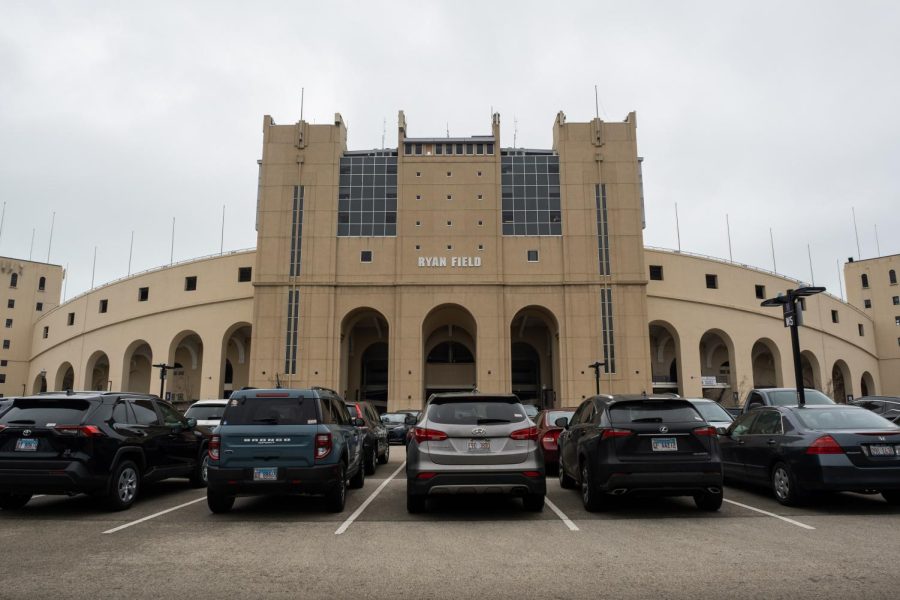Northwestern speakers address community concerns at 7th Ward special topic meeting on Ryan Rebuild project
Daily file photo by Seeger Gray
Tuesday’s meeting focused on the proposed planned development’s noise assessment, traffic, parking and concert operations.
June 28, 2023
At the 7th Ward special topic meeting hosted by Ald. Eleanor Revelle (7th) Tuesday, Northwestern speakers addressed concerns about the proposed Ryan Rebuild project, presenting on noise assessment, traffic, parking and concert operations.
Before presentations on behalf of the University, Land Use Commission Chair Matt Rodgers explained the two aspects of the project that the Land Use Commission would either recommend or deny: a text amendment that would allow concerts within the U2 Zoning district and the proposed planned development, which would be a special use permit to rebuild the stadium.
Community Development Director Sarah Flax clarified that the city can approve the proposed planned development even if the text amendment is denied.
“That would enable the University to rebuild a stadium, it just wouldn’t allow concerts in it,” Flax said. “They would be able to do their standard of operations now. The text amendment and the planned development are separate approvals.”
Dave Davis, senior executive director of neighborhood and community relations at NU, said he understands there are concerns about the project, but that the University hopes to utilize the space — which “sits empty for over 95% of the days each and every year” — to bring people together.
He mentioned ideas including hosting an ice skating rink, yoga session or sleepover in the stadium.
“If there are folks that are in this room that oppose the project and you oppose it because you don’t think we have a strong enough plan to prevent against any kind of community harm or that it might somehow degrade your quality of life, I simply say, give us a chance,” Davis said.
CAA ICON Senior Director Michael Godoy explained the “well orchestrated exercise” of coordination by the production touring group and the venue management team to bring in and set up sound and lighting for a concert, which the stadium does not have.
In response to Revelle’s question about whether enough electricity will be supplied in the stadium to hold concerts, Godoy said the stadium is being designed to be self-sufficient, but portable generators may be needed in some cases.
To assess noise levels, Greg Hughes, associate principal at Wrightson, Johnson, Haddon and Williams Inc., said they had measured ambient noise levels from Friday night through Sunday night in various locations, including the parking lot of the existing stadium and nearby residential areas.
“Generally speaking, the 60 to 65 dBA is the noise level one would experience walking through the neighborhood during a game day,” Hughes said. “So the average concert activity noise level that we’ve determined for the community immediately around it is at 65 dBA. That is not inaudible, but is similar to the ambient levels, frequency wise and so forth.”
Revelle raised the concern that many attendees may drive and need shuttles to get to their cars after a concert, potentially leading to thousands of people waiting by the venue for an extended period of time. Peter Lemmon, a senior transportation engineer at Kimley-Horn, suggested organizing multiple lines and loading several buses simultaneously as a possible solution.
Lemmon also said Ryan Field’s location near both a Metra and CTA transit line may provide an opportunity for people to choose public transportation instead of driving.
He added that they have had preliminary conversations with the CTA and Metra to add additional trains to the schedules following an event.
To address additional concerns, Revelle said there will be further special topic meetings with NU.
“There’s still some big issues that we’ve not covered, particularly, for example, the demolition and construction process and how that’s going to work,” Revelle said. “That’ll be probably our next big topic.”
For residents to have their opinions heard, Rodgers recommends submitting them in writing prior to the Land Use Commission meeting, since speaking time will likely be limited due to high attendance.
The meeting is not yet scheduled but tentatively planned for early August.
“Evanston is a very civically engaged community,” Rodgers said. “That’s good. That’s bad. I’ll let you weigh the pluses and minuses of that. But we do like to hear from the citizens.”
However, Rodgers said comments should concern the standards set out in the City Ordinance — four for a text amendment and nine for a special use permit — which include factors like compatibility with existing development, adverse effects on the value of adjacent properties, adequacy of public facilities and services and traffic congestion.
“Coming to us with vague generalities doesn’t help us in our decision making,” Rodgers said. “There are also certain things that we have no control over. I know Northwestern doesn’t pay property taxes. I can’t change that. So coming and making an argument to the Land Use Commission that property taxes should be paid by Northwestern is not something that we can even consider.”
Email: divyabhardwaj2025@u.northwestern.edu
Related Stories:
— Community, Northwestern groups form alliance against Rebuild Ryan Field
— Central Street businesses divided over impact of Ryan Field rebuild
— NU pushes for Ryan Field renovation, 7th Ward neighbors criticize expected repercussions



